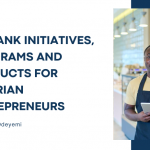When we hear the word crisis, our minds often leap to images of natural disasters, wars, or pandemics. But for many African entrepreneurs, crisis looks different. It can be an investor’s silence after months of negotiation. It can be the sudden collapse of a business built on borrowed trust. It can be the quiet, invisible exhaustion of carrying a dream too heavy to set down.
This year’s World Mental Health Day focuses on ‘Access to Care – Mental Health in
Catastrophes and Emergencies.’ The campaign calls attention to the urgent need for accessible, culturally sensitive mental health support in times of crisis. Yet, in the African context, emergencies often happen far from the spotlight.
When the Storm Is Inside
Consider Aisha, a young agripreneur in Ghana whose farms were destroyed by flooding. She fought to rebuild, comforting her workers and reassuring investors, but privately, the loss left her hollow. Nights became restless, mornings heavier. There were no counsellors nearby, and even if there were, she wasn’t sure she’d be understood. In her community, strength meant endurance, not expression.
Then there is Tunde, a Lagos-based founder who lost a major funding round during
Nigeria’s economic downturn. The pressure to stay afloat pushed him past his limits. He stopped eating properly, isolated himself, and ignored the signs of burnout until his health forced him to pause. To his peers, he looked successful. Inside, he was barely surviving.
Crisis Does Not Always Look Like War
For entrepreneurs, crisis can mean watching payroll deadlines approach with no cash in sight. It can be navigating political instability, market failure, or personal loss while leading a team that depends on your composure. The emotional toll of entrepreneurship in Africa often goes unseen, yet it is real, layered, and growing.
While global discussions on mental health in emergencies often focus on conflict zones and refugee camps, there is a need to broaden the conversation. A founder’s crisis may not destroy buildings, but it can quietly dismantle their well-being. Without access to mental health care, these silent battles continue in isolation.
Towards Accessible and Culturally Grounded Support
Across the continent, access to mental health services remains limited. In some countries, there are fewer than one psychiatrist for every 100,000 people. Many rely on community resilience, faith, or informal networks to cope. Yet, as the pressures of modern business grow, traditional support systems are struggling to carry the weight alone.
The World Federation for Mental Health (WFMH) calls for mental health to be integrated into all emergency response systems. But integration must also mean inclusion—building care models that reflect local cultures, languages, and lived realities. In Africa, that means training local counsellors, investing in psychosocial education, and normalizing help-seeking behavior within business and community spaces.
A Call for Compassion and Conversation
This World Mental Health Day, the message is simple: access to care should not depend on where you live or what kind of crisis you face. Mental health is not a privilege for the few—it is a necessity for all.
For African founders, resilience has long been celebrated as a badge of honor. But resilience without rest is unsustainable. Strength must now include the courage to admit exhaustion, the humility to seek help, and the compassion to care for one another.
Crisis does not always come with headlines. Sometimes it comes quietly, in the form of an unanswered email, a failed idea, or a long silence after years of effort. And when it does, the world must remember that mental health support is not optional. It is part of the recovery, the rebuilding, and the human story that continues after every storm.










